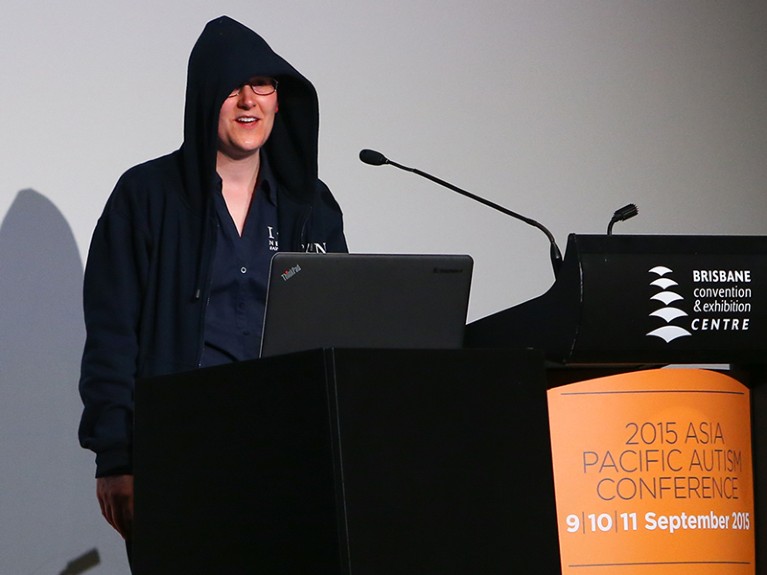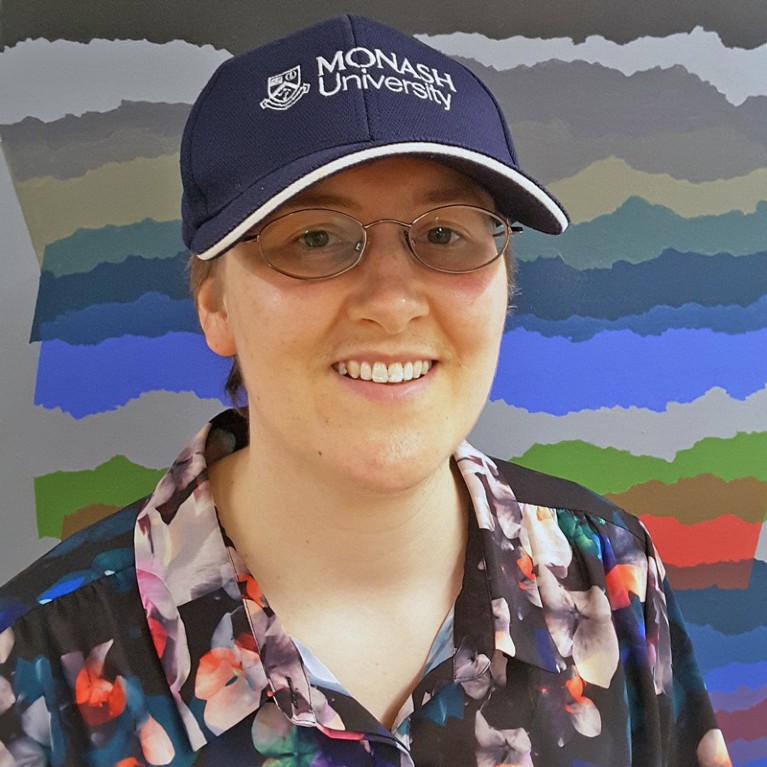
Biostatistician Penny Robinson uses her hoodie to shade her eyes from the spotlight’s bright glare during a conference talk.Credit: Paul Fletcher
Diagnosed with autism as a teenager, Penny Robinson navigates life on her own terms. In secondary school, she loved science and found her calling in crunching numbers. She faced several challenges, such as bullying from other students, following ad hoc plans to complete studies at her own pace and eventually opting to earn a master’s degree instead of a PhD. But those struggles didn’t stop Robinson from becoming a biostatistician and lecturer in the department of epidemiology and preventative medicine at the Monash University School of Public Health and Preventative Medicine in Melbourne, Australia. Committed to helping others in their careers, she also co-founded the I CAN Network, an organization that mentors young autistic people.
But Robinson still faces hurdles, and in her academic career, she often must deal with the bright lights, crowds and sensory overload that come with conferences, departmental seminars and networking events. Robinson tells Nature how participating in these activities, which are crucial for opportunities and collaborations, might not be equally fruitful for all. But luckily, she says, there are ways to easily support all scientists — whether they are neurodiverse or not.
How have you managed your neurodiversity in your career?
I was diagnosed at the age of 14. By the time I started university, I’d worked out who I was as a person and was aware of my needs.
For instance, I suffered panic attacks in the school auditorium. When I started my undergraduate programme at Monash in 2002, I identified that the environment of the auditorium is similar to that of the lecture theatre. I had registered with the university’s disability support services office and felt empowered to tell lecturers and people seated nearby about my need to exit lecture halls quickly. I could express myself without having to hide. Being in a supportive environment gave me the confidence to discuss my needs openly.
You are also an advocate for autistic people. Why do you think speaking up is necessary?
In the right environment, people feel empowered to say, “I’m neurodiverse, and these are the things that I like best and the things that I struggle with.” I am an ambassador for the I CAN Network, I mention my autism in my lecturer profile and I give talks about my personal experience of being autistic. Students often reach out to get advice for coping strategies, or they simply want to know that there’s someone else with autism out there.
Is navigating the science workplace trickier for neurodiverse people?
Yes, absolutely. Even your career stage and the type of work contracts that you have can play into this. If you are an early-career scientist, you might worry that talking openly about being neurodiverse — and your associated needs — will affect your ability to get grants or to secure a postdoctoral position. At Monash, my needs have always been supported, and this helped me to reach my career goals. If you sense that you’re different, knowing that you won’t be judged and that you will instead be helped is good.

Biostatistician Penny Robinson says that researchers should not be afraid to discuss their neurodiversity needs at work.Credit: Michael Abramson
How can employers and event organizers make sure that meetings are accessible to all scientists?
Accommodating people’s needs is best achieved through flexibility — for example, through hybrid working. At home, I have the same levels of productivity and can save energy for when I am needed in person.
A few months ago, I had two work events on the same day. The morning meeting was in-person only. It was hours of listening to presentation after presentation in a horrible lecture room with a lot of lights shining like spotlights from the ceiling, which are very disturbing to me. I was wearing a hat and hiding at the back for most of the event. Participating through Zoom would have been much easier for me.
On the same day, there was a hybrid afternoon networking event. I wanted to attend in person, to get the most out of it. The whole day was exhausting. I wasted lots of energy on the morning event, and I didn’t have much left for networking, which I cared more about.
Again, flexibility and open communication between organizers and attendees are key to improving opportunities for everyone. Having the choice of how to attend meetings means I can prepare in advance.
Travelling is crucial for academic careers. What have you learnt about navigating the extra stress that comes with attending conferences?
When it comes to distant conferences, there is extra pressure: someone paid for you to be there. So, even if you feel overloaded, you just keep going.
On social media, I’m known as the ‘hoodie girl’. The nickname came after an ‘accident’ at the Asia Pacific Autism conference in Brisbane, Australia, several years ago. I was asked to give a talk, but I had a whole week of teaching and could attend the conference only on the day of my seminar. The teaching and the travel were exhausting, and I was overwhelmed when I arrived. Despite having had a whole night’s sleep, I was still aching from sensory overload. When I saw the dark room and the massive spotlight on the speaker, I just could not cope.
So, I put my hoodie up to shield myself from the lights. The session chair encouraged me to speak with the hood on. I embraced it and became the hoodie girl. Eventually, other people also said that they were bothered by the lights. But they didn’t have a cap or hoodie, or the confidence that I’ve developed, so they just had to grin and bear it.
In this case, it would have been better for me to fly in advance, get in the zone and attend the conference. For neurodiverse people, getting the most out of distant conferences often means having the full support to travel there when they need to, not simply when their work schedule allows.
What are your top three tips for conference organizers to lower barriers for neurodiverse researchers?
First, if you’re going to run a hybrid event, ensure that the proper technologies are in place and work well. Have enough microphones in the rooms, set up the Zoom links correctly and have the laptop facing the right direction. These things might seem obvious, but I have experienced conferences at which none of these things were prepared.
Second, think carefully about the schedule. Often, there are lots of seminar sessions with short breaks. But processing all the information, joining the queue for the toilets, finding food and catching up with people in a 15-minute break is nearly impossible for any scientist. Having shorter sessions and more time for breaks would help everyone to absorb the talks better and to network throughout the whole conference.
Finally, set up a quiet space so that people can rest their minds. Conference venues are often busy and noisy. One thing that I liked about online conferences was the one-hour lunch break. I could go away from my computer and experience complete quiet. If I’ve been listening to lots of information, I need that before I can function again. Sometimes, an autistic person needs to have a quiet room for lunch or breaks in smaller groups, away from the noise of 1,000 other people. This helps everyone to be social and network better.



